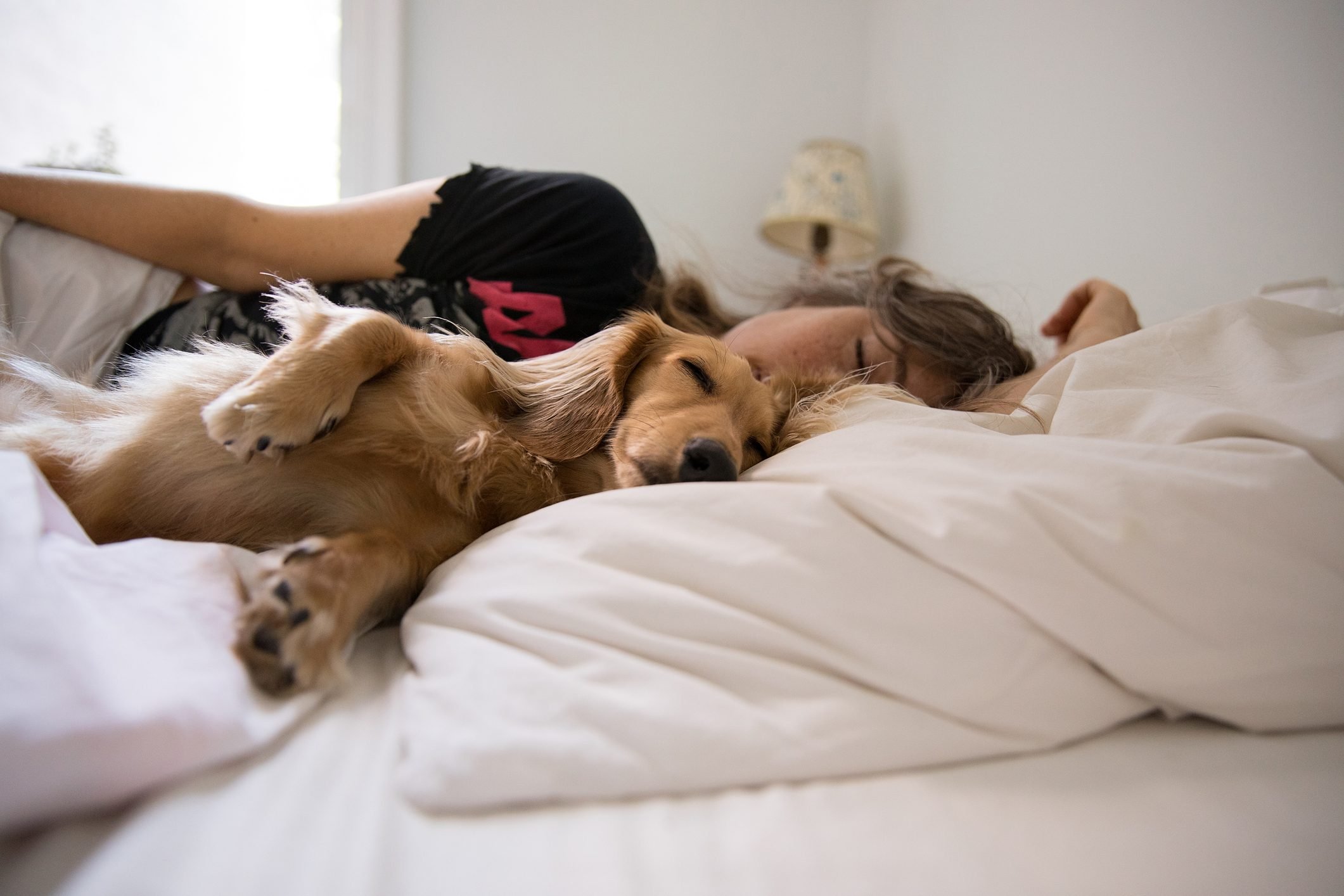Should Your Dog Be Sleeping in Your Bed? Here’s What the Experts Say
Updated: Apr. 20, 2023
We asked a panel of experts—including an allergist, a sleep expert, a relationship expert, and an animal trainer—to weigh in on whether it's wise to sleep with your dog in bed.
Letting your dog sleep in the bed: Good or bad idea?
According to Jerry Klein, the chief veterinary officer with the American Kennel Club, surveys have shown that nearly 50% of pet owners share their bed or bedroom with their pet. Who can blame you? Your dog (or cat) really is the perfect companion: Adorable, loyal, loving, and a great listener to boot.
While there may be nothing better than cuddling with your pet….should you sleep with your dog in the bed?
There’s not a one-size-fits-all answer to this question, and there are lots of strong opinions on both sides of the argument.
It comes down to weighing the benefits (snuggling with your pet keeps you warm and content) versus the risks (your dog makes your partner sneeze and wheeze, tends to disrupt your sleep quality, or gives you aches and pains as you pretzel your legs around them…precious, though they are).
We asked a panel of experts—including an allergist, a sleep expert, a relationship expert, and an animal trainer—to weigh in on whether and when you should sleep with your dog in bed.
‘The Office’ Star Angela Kinsey Shares the Hilarious Reason She Can’t Sleep
An allergist’s perspective
Around 10-20% of people worldwide have a dog or cat allergy, according to the Asthma and Allergy Foundation of America. Kanao Otsu, MD, an allergist and immunologist at National Jewish Health in Denver, says if you or your partner is allergic to your dog, your dog should probably not sleep in your bed or even your bedroom. “Cats and dogs are the most common indoor allergens besides dust mites and cockroaches, and there is no such thing as a hypoallergenic dog or cat,” Dr. Otsu says.
15 Health Myths That Make Doctors Cringe
It doesn’t matter if your dog doesn’t shed, she says. “The allergens are in saliva and skin, and all dogs have skin and saliva.” When your pet sleeps in bed with you, there is about an eight-hour window of continuous exposure to these allergens. “That is a high allergen load,” Dr. Otsu notes.
Steven Cole, DO, with the Park Lane Allergy and Asthma Center in Dallas, adds that even when your pets are not in your bed they leave behind the allergens that cause you to have symptoms, and these allergens can persist for weeks and even months.
For some pet lovers, allowing your dog to share your bed may mean you end up waking with sniffles, while for others it may cause itchy, watery eyes, or wheezing, and asthma symptoms.
Ultimately, the decision on where your dog should sleep in your bed or bedroom depends on the severity of your or your partner’s allergies, Otsu says.
In addition to causing allergies, sleeping with your pet could expose you to fleas or ticks they may be carrying.
Although fleas can’t live on humans, they can certainly bite you if the opportunity arises.
Flea bites may come in sets of three—sometimes called breakfast, lunch, and dinner—a bite pattern that can be mistaken for bed bugs.
Fleabites: What They Look Like and How to Prevent and Treat Them
To prevent your risk of flea or tick bites, make sure to check your pet for fleas and ticks, see a veterinarian for the proper flea and tick treatment and prevention, vacuum your home and wash bedding frequently, and wash your pet with soap and water, while also using a flea comb.
Aside from potentially exposing you to parasites like fleas and ticks, Klein says that scientific research has shown that certain bacteria, viruses, and other types of parasites can be communicable between pets and humans, especially under extremely close and prolonged contact. He adds that pediatricians usually do not recommend that children with allergies share sleeping areas with pets, and people with immunocompromised conditions should consult with their physician before electing to share their bed with pets.
18 Products That Can Help You Get Rid of Fleas
How to minimize allergen exposure
As for allergens, there are ways to minimize your exposure if you absolutely must sleep with your beloved pet, Dr. Otsu says.
A high-efficiency particulate air (HEPA) filter can help remove animal dander from the air. “You can get rid of carpet, which is more likely to trap animal dander and hair, and opt for hardwood floors instead,” she adds.
Washing your pet, and your bedding, weekly can also cut down on allergens. The goal is to lower your allergen load, so you don’t have to do all of this all of the time. It’s also possible to become desensitized to your pet over time, she says.
How Often Should You Wash Your Sheets? Here’s What Germ Experts Recommend
Denise Herman, founder and head dog trainer at Empire of the Dog in New York City, further explains that you can minimize the amount of pet-related germs in your bed by wiping your pets’ paws before letting them climb in. “You can also put your pet in an onesie to prevent hair and dander in your bed,” she says.
Otsu concludes by saying that if you experience allergy symptoms, it’s a good idea to see an allergist to find out exactly what you are allergic to as it may not be your dog, after all.
The 9 Best Air Purifiers for Pets
Does sleeping with your dog disrupt your sleep?
Joseph M Dzierzewski, PhD, vice president of research and scientific affairs with the National Sleep Foundation, says that whether sleeping with a dog disrupts your sleep in a tricky question.
“We know that people who share their beds with their pets typically report good sleep quality, despite evidence to suggest that their sleep may actually be disrupted when measured with objective sleep tests,” he explains. “So we have a bit of a paradox: People who sleep with pets report good quality sleep even though their sleep may, in actuality, be a little disrupted.”
Why may sleeping with your pooch disrupt your sleep?
Klein says that your quality of sleep can be affected by sharing a bed with a dog because dogs tend to be light sleepers and stay alert for sounds, even while they are sleeping. This means they may wake up throughout the night in response to noises or movement more often than you do.
According to the AKC, dogs are also polyphasic sleepers, which means they average three sleep-wake cycles every nighttime hour. Humans, on the other hand, are monophasic sleepers, meaning we tend to have one period of sleep during a 24-hour cycle.

Potential health benefits of your dog sleeping in the bed
There are many benefits to sleeping with your dog in the bed, says sleep medicine expert Raj Dasgupta, MD, an assistant professor of clinical medicine at the Keck School of Medicine at the University of Southern California in Los Angeles and a spokesperson for American Academy of Sleep Medicine.
“Sleeping with a pet provides comfort and security like a weighted blanket or favorite pillow,” he says. This may be because your light-sleeping canine companion, who is constantly monitoring for noises and movement, can alert you to potential threats while you’re sleeping.
Pets reduce anxiety and one of the main manifestations of anxiety is insomnia, Dasgupta says. So ultimately, “anything that will help you sleep longer, get better quality of sleep and [experience] less arousal in the night is a good thing.”
The 9 Best Dog Breeds That Help With Anxiety, According to Animal Experts
The experts say that there are many additional mental and physical health benefits to owning a pet, and sleeping with your beloved furry friend may increase those benefits by increasing how much time you spend with them. For example, Johns Hopkins medical school‘s blog suggests simply petting your dog can reduce your levels of the stress hormone cortisol and boost your levels of the so-called ‘feel-good hormone,’ oxytocin. They add that pets can also be excellent bed warmers.
These 4 Sleep Behaviors Can Help You Live Longer, Says New Research
A relationship expert’s perspective
Another factor to consider is how having your dog in your bed affects your sex life, says Pepper Schwartz, a professor of sociology at the University of Washington in Seattle and a relationship expert on the reality show Married at First Sight.
If your pet won’t let you get close to your partner, you have a problem, she says. “Your priority should be your partner,” she says. “If you are welcoming your animal into bed to avoid sex, you need to address it to see what you can fix and what is going on between you and your partner.”
You are not rejecting your dog, she stresses. “They are habit-forming animals, and you can create new habits for them by placing a lovely bed on the floor and rewarding them for using it,” she suggests.
11 Wonderful Things that Could Happen If You Go to Bed an Hour Earlier
A dog trainer’s perspective
Herman says that in general, if you don’t have allergies and there isn’t a real estate problem due to the bed size, it’s more than OK to sleep with your dog if you want to.
But she adds that there are some rules when it comes to letting your dog sleep on the bed.
Rules for letting the dog sleep in the bed
Herman says to wait until your dog is nine to 12 months before you start to introduce your dog into your bed. If you do it too early, there could be some issues. “Always invite them in after they pee and poop and not when they are in a rowdy stage,” she says, adding that to protect your bed from bathroom mishaps, it’s smart to invest in a waterproof mattress cover.
Herman also says that your bed and bedroom should be a quiet place to unwind for you and your pet, explaining that you don’t want to make the bed a play or chew place.
While you may want to have your dog in your bed every night, Herman says it’s important to have some variability in your co-sleeping schedule so your dog doesn’t become anxious if you don’t want them in the bed for any reason. Herman suggests that some nights you can have your pooch sleep in an open crate or comfy dog bed placed elsewhere in the bedroom or just outside the door.
She adds that your dog’s temperament should also plays a role in the decision about whether or not to let them sleep in your bed. She explains that some dogs could become territorial over the bed and may display signs of aggression to protect their sleeping spot.
This can become an issue if, for example, you have a new baby who will also join you in the bed on occasion. Herman says to nip this type of behavior in the bud by working with a skilled trainer and to provide your dog with a separate sleeping space until this behavior stops.
What Is Allergy Immunotherapy, and Does It Work?
The last word on your dog sleeping in bed
If you or your partner has severe allergies and your pet is a trigger, it’s probably a good idea to keep your pet out of the bed or bedroom or take steps to lower your exposure to allergens.
But if your fur baby helps you sleep and isn’t interfering with your sex life or getting territorial, it’s the more the merrier. And at the end of the day, Dzierzewski says that whether to share your bed with your dog should be an individual decision.
- Here’s How Long Your Shower Should Really Take, According to a Doctor on Aging
- An MD Lists the 5 Warning Signs You Have Bad Hygiene
- Research Shows Owning This Type of Pet Could Extend Your Lifespan
- 5 Healthy Reasons to Bike Instead of Drive, According to Experts
Additional writing and reporting by Jennifer Huizen.








![How to Massage Your Dog, According to Certified Dog Massage Therapists [With Instructional Video]](https://www.thehealthy.com/wp-content/uploads/2023/04/GettyImages-1357930308.jpg?resize=72,72)














